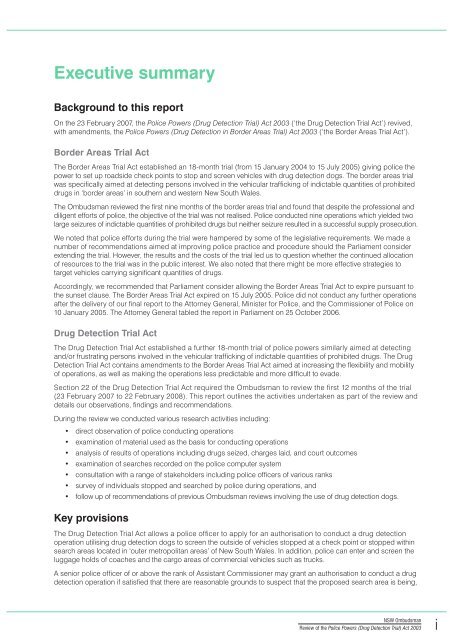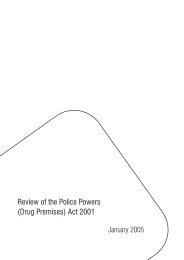Review of the Police Powers (Drug Detection Trial) Act 2003 - NSW ...
Review of the Police Powers (Drug Detection Trial) Act 2003 - NSW ...
Review of the Police Powers (Drug Detection Trial) Act 2003 - NSW ...
Create successful ePaper yourself
Turn your PDF publications into a flip-book with our unique Google optimized e-Paper software.
Executive summary<br />
Background to this report<br />
On <strong>the</strong> 23 February 2007, <strong>the</strong> <strong>Police</strong> <strong>Powers</strong> (<strong>Drug</strong> <strong>Detection</strong> <strong>Trial</strong>) <strong>Act</strong> <strong>2003</strong> (‘<strong>the</strong> <strong>Drug</strong> <strong>Detection</strong> <strong>Trial</strong> <strong>Act</strong>’) revived,<br />
with amendments, <strong>the</strong> <strong>Police</strong> <strong>Powers</strong> (<strong>Drug</strong> <strong>Detection</strong> in Border Areas <strong>Trial</strong>) <strong>Act</strong> <strong>2003</strong> (‘<strong>the</strong> Border Areas <strong>Trial</strong> <strong>Act</strong>’).<br />
Border Areas <strong>Trial</strong> <strong>Act</strong><br />
The Border Areas <strong>Trial</strong> <strong>Act</strong> established an 18-month trial (from 15 January 2004 to 15 July 2005) giving police <strong>the</strong><br />
power to set up roadside check points to stop and screen vehicles with drug detection dogs. The border areas trial<br />
was specifically aimed at detecting persons involved in <strong>the</strong> vehicular trafficking <strong>of</strong> indictable quantities <strong>of</strong> prohibited<br />
drugs in ‘border areas’ in sou<strong>the</strong>rn and western New South Wales.<br />
The Ombudsman reviewed <strong>the</strong> first nine months <strong>of</strong> <strong>the</strong> border areas trial and found that despite <strong>the</strong> pr<strong>of</strong>essional and<br />
diligent efforts <strong>of</strong> police, <strong>the</strong> objective <strong>of</strong> <strong>the</strong> trial was not realised. <strong>Police</strong> conducted nine operations which yielded two<br />
large seizures <strong>of</strong> indictable quantities <strong>of</strong> prohibited drugs but nei<strong>the</strong>r seizure resulted in a successful supply prosecution.<br />
We noted that police efforts during <strong>the</strong> trial were hampered by some <strong>of</strong> <strong>the</strong> legislative requirements. We made a<br />
number <strong>of</strong> recommendations aimed at improving police practice and procedure should <strong>the</strong> Parliament consider<br />
extending <strong>the</strong> trial. However, <strong>the</strong> results and <strong>the</strong> costs <strong>of</strong> <strong>the</strong> trial led us to question whe<strong>the</strong>r <strong>the</strong> continued allocation<br />
<strong>of</strong> resources to <strong>the</strong> trial was in <strong>the</strong> public interest. We also noted that <strong>the</strong>re might be more effective strategies to<br />
target vehicles carrying significant quantities <strong>of</strong> drugs.<br />
Accordingly, we recommended that Parliament consider allowing <strong>the</strong> Border Areas <strong>Trial</strong> <strong>Act</strong> to expire pursuant to<br />
<strong>the</strong> sunset clause. The Border Areas <strong>Trial</strong> <strong>Act</strong> expired on 15 July 2005. <strong>Police</strong> did not conduct any fur<strong>the</strong>r operations<br />
after <strong>the</strong> delivery <strong>of</strong> our final report to <strong>the</strong> Attorney General, Minister for <strong>Police</strong>, and <strong>the</strong> Commissioner <strong>of</strong> <strong>Police</strong> on<br />
10 January 2005. The Attorney General tabled <strong>the</strong> report in Parliament on 25 October 2006.<br />
<strong>Drug</strong> <strong>Detection</strong> <strong>Trial</strong> <strong>Act</strong><br />
The <strong>Drug</strong> <strong>Detection</strong> <strong>Trial</strong> <strong>Act</strong> established a fur<strong>the</strong>r 18-month trial <strong>of</strong> police powers similarly aimed at detecting<br />
and/or frustrating persons involved in <strong>the</strong> vehicular trafficking <strong>of</strong> indictable quantities <strong>of</strong> prohibited drugs. The <strong>Drug</strong><br />
<strong>Detection</strong> <strong>Trial</strong> <strong>Act</strong> contains amendments to <strong>the</strong> Border Areas <strong>Trial</strong> <strong>Act</strong> aimed at increasing <strong>the</strong> flexibility and mobility<br />
<strong>of</strong> operations, as well as making <strong>the</strong> operations less predictable and more difficult to evade.<br />
Section 22 <strong>of</strong> <strong>the</strong> <strong>Drug</strong> <strong>Detection</strong> <strong>Trial</strong> <strong>Act</strong> required <strong>the</strong> Ombudsman to review <strong>the</strong> first 12 months <strong>of</strong> <strong>the</strong> trial<br />
(23 February 2007 to 22 February 2008). This report outlines <strong>the</strong> activities undertaken as part <strong>of</strong> <strong>the</strong> review and<br />
details our observations, findings and recommendations.<br />
During <strong>the</strong> review we conducted various research activities including:<br />
• direct observation <strong>of</strong> police conducting operations<br />
• examination <strong>of</strong> material used as <strong>the</strong> basis for conducting operations<br />
• analysis <strong>of</strong> results <strong>of</strong> operations including drugs seized, charges laid, and court outcomes<br />
• examination <strong>of</strong> searches recorded on <strong>the</strong> police computer system<br />
• consultation with a range <strong>of</strong> stakeholders including police <strong>of</strong>ficers <strong>of</strong> various ranks<br />
• survey <strong>of</strong> individuals stopped and searched by police during operations, and<br />
• follow up <strong>of</strong> recommendations <strong>of</strong> previous Ombudsman reviews involving <strong>the</strong> use <strong>of</strong> drug detection dogs.<br />
Key provisions<br />
The <strong>Drug</strong> <strong>Detection</strong> <strong>Trial</strong> <strong>Act</strong> allows a police <strong>of</strong>ficer to apply for an authorisation to conduct a drug detection<br />
operation utilising drug detection dogs to screen <strong>the</strong> outside <strong>of</strong> vehicles stopped at a check point or stopped within<br />
search areas located in ‘outer metropolitan areas’ <strong>of</strong> New South Wales. In addition, police can enter and screen <strong>the</strong><br />
luggage holds <strong>of</strong> coaches and <strong>the</strong> cargo areas <strong>of</strong> commercial vehicles such as trucks.<br />
A senior police <strong>of</strong>ficer <strong>of</strong> or above <strong>the</strong> rank <strong>of</strong> Assistant Commissioner may grant an authorisation to conduct a drug<br />
detection operation if satisfied that <strong>the</strong>re are reasonable grounds to suspect that <strong>the</strong> proposed search area is being,<br />
<strong>NSW</strong> Ombudsman<br />
<strong>Review</strong> <strong>of</strong> <strong>the</strong> <strong>Police</strong> <strong>Powers</strong> (<strong>Drug</strong> <strong>Detection</strong> <strong>Trial</strong>) <strong>Act</strong> <strong>2003</strong><br />
i

















